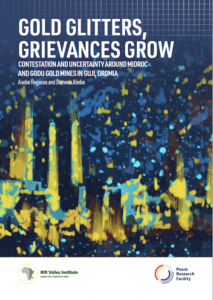SUMMARY
• Despite political change at the national level, resource extraction in the two Guji zones (Guji and West Guji) of the Oromia Region continues to exclude local communities. This is particularly so in the case of MIDROC – a mining and oil company owned by Saudi billionaire Sheik Mohammed Hussein Al Amoudi.
• Local companies, such as GODU General Trading S.C. (GODU), established under the Prosperity Party (PP), have co-opted youths and privileged local business elites as a means of diffusing tensions that emerged in 2018 related to MIDROC’s operations in the region.
• The coming to power of Prime Minister Abiy Ahmed and the PP in 2018 empowered a new group of political and economic actors within the regional government of Oromia. This has led to an increased number of licences being granted for gold extraction in the Oromia region, leading to a new gold rush, particularly in the Guji zones.
• There has, however, been significant opposition to some new mining projects. Since 2018 the government has shifted its approach to dealing with this from cooptation to severe coercion, including violence through forcible land expropriation.
• Popular resistance to the human and environmental impacts of MIDROC’s gold mine prompted the government to suspend the company’s licence in May 2018. It allowed the mine to reopen in March 2021 without the underlying causes of the protests being addressed. Rather, by transferring a MIDROC site—the Okote mine—to GODU, it attempted to co-opt local elites and businessmen.
• The socio-economic and environmental impacts of newly established companies such as GODU are not yet clear due to a lack of transparent environmental impact assessments and the relatively recent commencement of mineral extraction. Local community resentment against MIDROC is, however, palpable.
• In the long run, local grievances may lead to renewed resistance against mining, unless the government introduces mechanisms that facilitate the following: community benefit-sharing; proper compensation; increased and equitable employment opportunities; and consultations with local communities that incorporate prior consent to mining and meaningful input on issues such as environmental and socioeconomic impacts.
This report was written for the Ethiopia Peace Research Facility (PRF). The PRF is an independent facility combining timely analysis on peace and conflict from Ethiopian experts with support for conflict-sensitive programming in the country. It is managed by the Rift Valley Institute and funded by the UK government.
Find the Amharic version of the report summary here.




